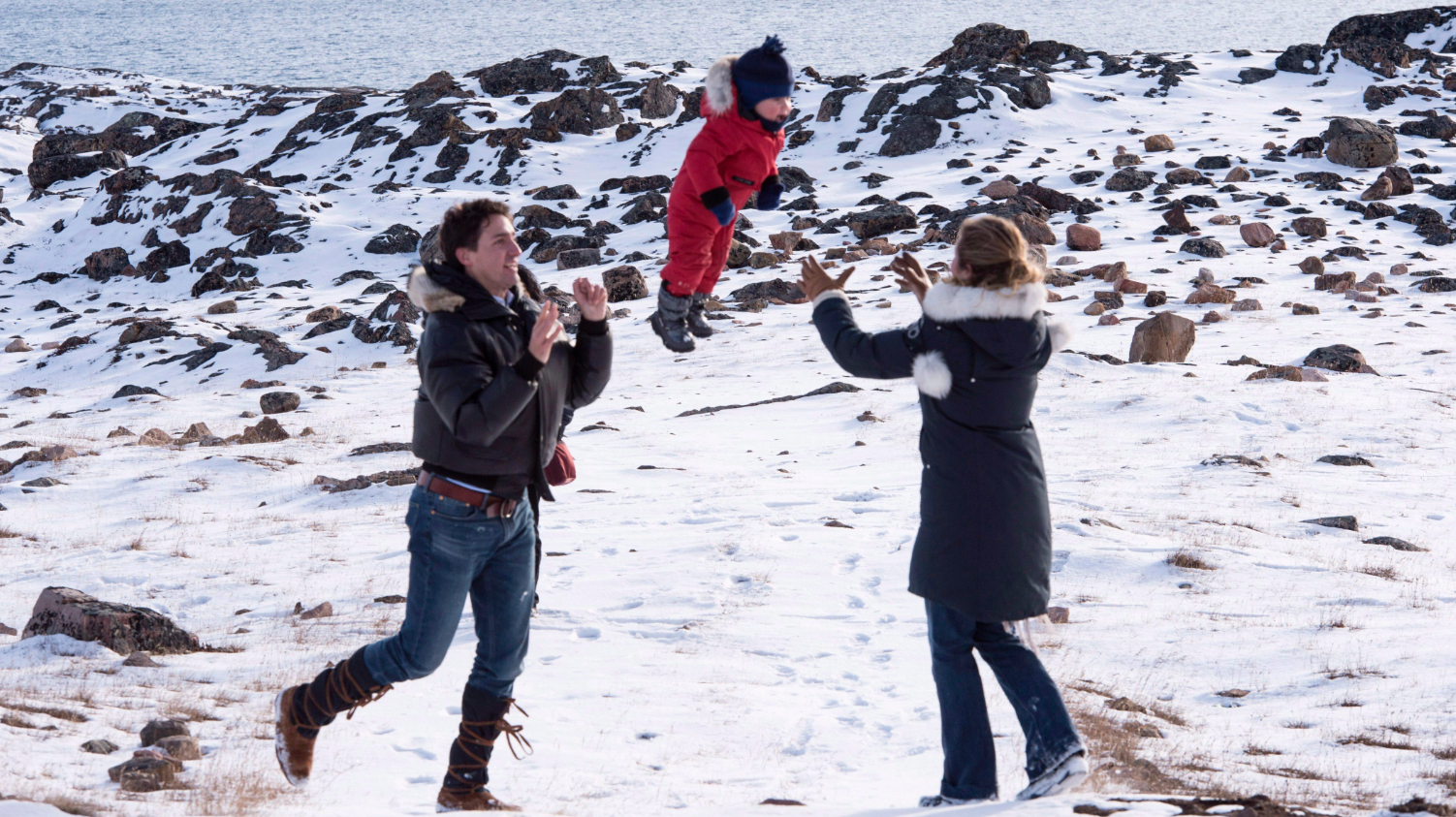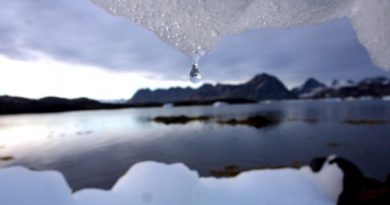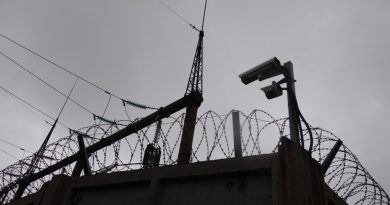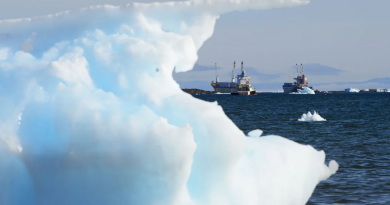Blog: What does Trudeau win mean for Arctic?

On Monday, Liberal Member of Parliament Justin Trudeau swept to victory, ousting Conservative leader Stephen Harper after nine years in office.
In addition, a record ten indigenous MPs were elected to Parliament, including one Métis member from the Northwest Territories and an Inuit member from Nunavut. The Arctic was not a hot topic of debate during the election, but the change of power in Ottawa will still inevitably affect Canada’s Arctic policy.
Under Harper’s watch, the Arctic has changed significantly, both due to external forces and his government’s own actions. When Harper came into power in 2006, climate change was still a relatively minor worry. Al Gore’s breakthrough documentary, An Inconvenient Truth, was only released two years prior, for instance, and Hurricane Katrina had not yet struck. The Arctic ice cap, while steadily declining, had not yet plummeted to the record minimum it would reach in 2012.
In the world of Arctic politics, the Arctic Council was a less prominent body: its members had never signed a treaty under its auspices, nor did the Asian states yet hold observer status. Ties between Russia and the West were significantly better, with Russia’s wars in Georgia and Ukraine not having yet thrown a wrench into the relationship. Russia had also not yet planted a flag underneath the North Pole, which it did in 2007. And at the beginning of Harper’s rule, offshore Arctic oil seemed a faraway fantasy, too: oil cost $58 a barrel in 2006 (about the price it is now!), and the landmark USGS Circum-Arctic Resource Appraisal would not be released for another two years. Now in 2015, Russia’s Prirazlomnaya field has been pumping out barrels for over a year, while Shell’s endeavors in the Chukchi Sea have come and gone.
Harper’s legacy in the Arctic

The conservative-leaning National Post suggests, “Harper’s legacy may lie in the Arctic.*” Whether that legacy is good or bad is subjective, but the Canadian North has undoubtedly changed due to his initiatives. During the course of his administration, Harper pushed a sovereignty-focused, resource development-based strategy in the Arctic that involved taking a tough position with Russia while trying to stimulate economic activity at home. The famous five words he uttered in Esquimault at the announcement of the procurement of eight Arctic/Offshore Patrol Ships best sum up his view towards the Canadian North: “Use it or lose it.” After long delays, however, the only thing Harper has to show for those ships are mere artist’s impressions, putting a stain on his legacy. Similar delays have plagued the Canadian Coast Guard icebreaker that Harper commissioned, the John G. Diefenbaker. The post-war Canadian prime minister for whom the vessel is named is likely a figure Harper idolizes in terms of a pro-active policy in the Canadian Arctic policy.
Like Diefenbaker, Harper inaugurated construction on major infrastructure projects in the Canadian North, though much fewer in comparison. Whereas Diefenbaker realized the “roads to resources” program by building 1,400 kilometers across the North, the major Arctic highway that Harper is building will be less than 10% that distance. That highway is the Inuvik-Tuktotakyuk permanent all-weather road, which will replace the seasonal ice road and realize Diefenbaker’s dream of connecting Canada by road across all three of its coasts. Harper’s other major Arctic infrastructure project is the Canadian High Arctic Research Station (CHARS), on which construction has begun. Though it was designed as a scientific research station, one climate expert accused CHARS of being a “cloak” for Arctic oil. Both of these projects will leave permanent marks on the landscape of Harper’s Arctic legacy, for better or for worse. Harper could also leave a mark on maps of Canada, at least if he had his way: the prime minister essentially asked Canadian scientists to redraw Canada’s proposed claim to its continental shelf so that the North Pole would be included in Canada’s claim, flying in the face of geology.
Let’s not forget that Harper’s personal legacy in the Arctic, too. He has been a regular visitor to the Canadian North for years now, turning his annual summer visit into a marquee event. (Side note: When compared with the fact that President Barack Obama is the first sitting U.S. President to visit the Alaskan Arctic, it becomes evident how much more important the Canadian Arctic is to Canadian national identity than the Alaskan Arctic is to America’s.) It will be interesting to see whether Trudeau carries on this new tradition. The new leader visited Iqaluit during his campaign trail, so perhaps he’ll return to the North next summer.
Trudeau: Following in his father’s footsteps or setting a new path in the Arctic?
Justin Trudeau is now the new leader of the world’s second largest Arctic country. What can his words and actions since becoming a Member of Parliament in 2008 say about how he might shape Arctic policy?
First, it’s worth remembering that Trudeau is the son of former Prime Minister Pierre Elliott Trudeau, also a Liberal. The debates over Canada’s sovereignty in the Arctic occurred under his father’s watch in the 1970s. In 1969, controversy was erupting over the status of the Northwest Passage: Canada viewed (and still views) these as internal waters, while the U.S. prefers to see them as international straits. To clear the air, as the Canadian parliamentary records note, the elder Trudeau made a statement to the House of Commons “outlining the government’s policy regarding the question of Canadian sovereignty in the Arctic in light of the planned summer passage of the US tanker SS Manhattan through the Northwest Passage and into the Beaufort Sea: “The Canadian government has welcomed the Manhattan exercise, has concurred in it and will participate in it.”
The stances taken by the elder Trudeau’s government have continued to affect Canada’s Arctic policy today, and the issue of the country’s sovereignty in the Northwest Passage has not died. In 2009, the younger Trudeau voted, like everyone else in Parliament that day, to approve a bill stating:
That, in the opinion of the House, as the various waterways known as the “Northwest Passage” are historic internal waters of Canada, the government should endeavour to refer to these waterways as the “Canadian Northwest Passage”; recognize the importance of the Northwest Passage to the Inuit; support the identification of an appropriate Inuktitut name for the whole Northwest Passage in cooperation with Inuit land claims organizations and territorial governments; and that this name be used in conjunction with the “Canadian Northwest Passage” when referring to internal Canadian waterways.
As a loyal Canadian, he of course could not have voted any other way.
All in all, Justin Trudeau has not commented very often on Arctic affairs. He has made a few key remarks to the press, however, that show him sometimes agreeing with Harper and sometimes disagreeing.
Northerners’ welfare: In Iqaluit, he declared, “We understand that living in the North is expensive, and we will make sure that northern families have access to affordable, healthy food…After 10 years of neglect under Stephen Harper, Liberals will ensure that northern families have money to save, invest, and grow our economy now — not a decade from now.” The Liberals have pledged to pour $40 million into the Nutrition North program, which helps subsidize food costs for Northerners, and also increase the Northern tax break by 33% to reduce costs of living. But, as as exchange I highlight below demonstrates, throwing money at the problems of Northern indigenous peoples won’t solve larger systemic issues.
Russia: He accused Putin of being “unduly provocative” in the Arctic, taking a page out of Harper’s book.
Canadian continental shelf: Yet while Harper asked scientists to redraw Canada’s claim to its northern continental shelf, Trudeau diverged. He stated, “I am going to defer to scientists. There has been an awful lot of work done over the past years, and even decades, on mapping out the undersea floor of the North Pole to align with the United Nations regulations. … And I don’t know that it is a place where we need necessarily to have political interference. I trust our scientists and oceanographers in terms of how we’re mapping it.”
The biggest test of Trudeau’s policy in the Arctic may not be what he does directly in the region, but rather what he does with regard to climate change. While many are hopeful that the Liberal leader might restore Canada’s credentials as an environmentally-conscientious nation rather than a tar-sands-spewing, pipeline-laying energy superpower, The Guardian voiced more caution. Suzanne Goldenberg reported, “In his victory speech on Monday, there was no mention of climate change, and he was criticised for being vague on the issue during campaigning.” Trudeau also supports Keystone XL, though he opposes Northern Gateway, the pipeline that would transport tar sands oil through British Columbia. While Trudeau might be tougher on the oil sands industry, it would be foolish to think he will shut it down. Whether or not he will promote oil development in places like the Beaufort Sea has yet to be seen, but with the U.S. cancelling lease sales in the Beaufort and Chukchi Seas in part due to minimal industry interest, it’s hard to imagine the conditions will be all that different in Canada.
Trudeau: Northerners are “greater emitters”
In searching for Trudeau’s statements in Parliament regarding the Arctic, I came across an exchange between him, Dene National Chief Bill Erasmus, and a member of the Kitikmeot Inuit Association from November 2009 in the Standing Committee on Environment and Sustainable Development. The discussion is eye-opening because Trudeau accuses Northerners of being “greater emitters” and of needing to sacrifice more than people in the south. Yet the reason they are greater emitters has to do with their southern-imposed sedentarization. As a result, many have adopted gas-guzzling southern ways of life adapted to the North, from driving snowmobiles to living in heated homes. That isn’t necessarily a fault of their own, and action on reducing emissions still needs to happen first and foremost in the disproportionately more carbon-emitting South. Whether Trudeau understands this has yet to be seen, as evinced by this testimony.
Mr. Justin Trudeau (Papineau, Lib.):
Thank you very much.
Hello, Bill. Hello, Joe. It’s Justin Trudeau. Thank you very much, both of you, for being here. Thank you for sharing your perspective.
I’m interested in following up on some of Mr. Warawa’s comments. The government is regularly bringing forward the concerns around the costs associated with truly ambitious targets, more in line with the science, like a 20% reduction from 1990, or a 25% reduction.
It’s interesting to me to hear your perspective, because, as you’re only too aware, it’s more expensive to live in the north. You are therefore greater emitters, because of energy requirements and such, of greenhouse gases and carbon emissions. So any stringent targets, and ambitious targets, as Mr. Warawa showed in an example in an extreme case, would doubtless require a slightly larger level of sacrifice perhaps from the people in the north than elsewhere. Even given that, you seem to be still in favour of having ambitious targets and holding ourselves to them. Is that a fair assessment?
I’d like to hear from Bill first, but then Joe afterwards.
Chief Bill Erasmus:
It’s an economic question, but first of all, it’s one where people need to be involved. You can try to visualize what’s going to happen and then put a dollar figure to it. But our people up here are not interested in Canada giving us money to survive. We’re not into that.
Global warming is real. If you have an increase in temperature in the south, you know the ratio of how much it increases up here. If you get a 2% increase at the equator, it’s going to increase from 6% to 8% up here. Everything is escalating much beyond the imagination of anyone. So try to imagine the cost. It’s almost ridiculous to us.
First of all, it’s not Parliament’s choice to decide what’s going to happen to the future of Canada. It’s not the executive arm or the cabinet’s choice either. And it’s not a matter for the courts. This is beyond you people in Ottawa. And if you guys don’t wake up, we’re in trouble.
Mr. Justin Trudeau:
Thank you, Bill.
Joe, do you have a similar position? Do you see the cost of inaction as being far greater than the cost of action?
Mr. Joe Tulurialik:
I would like to voice my opinion on that. I do a lot of hunting, like a lot of others up here in the Arctic. We Inuit rely on our country food more than store-bought food. But guess what? It costs $23 for a quart of oil, and the price of gasoline has gone right through the roof. For me to get all those things to go out on the land, I have to work. And guess what I have to use? I have to use a loader that uses diesel. It puts a big strain on the people up here.
As Bill Erasmus said, we don’t want a dollar sign. We’re renewable, sustainability people. We live off the land. But we need our voices heard, and you guys need to know what it is like up here. You have to come up here to know how it is. We have people coming from the south going to the stores and saying, “These prices are ridiculous!” We already know that. But what can we do?
People in the House of Commons in Parliament make all kinds of bills and leave us out. It hurts us big time. Yes, we need help economically. Whether we’re in the north or in the south, there are people who say that we need more money and more mines. But the people who actually live up here say, “No, we do not need that.” There are people who are manipulating their power in this area, telling us we need jobs and mines to help our people. But they are really only representing themselves.
I just want to voice my concern. Yes, everything is very expensive up here. Yes, we need money. But no, you can’t put a dollar sign on all of that. We are people who live off the land.
Mr. Justin Trudeau:
Thank you, gentlemen.
The National Post op-ed on Harper’s legacy must be taken with a grain of salt, for it concludes with this gem: “Stephen Harper may yet prove to be Canada’s Thomas Jefferson, the president who doubled the size of the United States with the Louisiana Purchase and sent Lewis and Clark off in search of a route to the Pacific. At the very least, Mr. Harper has put God’s frozen people in the North back on the political map.”
Trudeau, at the very least, will be able to ride the coattails of some of Harper’s decisions. Assuming he stays in office for at least a couple of years, the Inuvik-Tuk road will be completed under his watch, as will CHARS. If he stays in office for, say, six years (which is a big if), the Arctic/Offshore Patrol Ships and CCGS John G. Diefenbaker will likely be delivered under his watch.
This post first appeared on Cryopolitics, an Arctic News and Analysis blog.
Related stories from around the North:
Canada: Election results in Canada’s North, Eye on the Arctic
Finland: UN rep. urges suspension of Sámi elections, Yle News
Greenland: Greenland, Alaska elections bolster Arctic resource extraction, Blog by Mia Bennett
Norway: Conservative victory in Norway: What does it mean for the Arctic?, Blog by Mia Bennett
Sweden: Land, water rights big issues in Sweden’s Sami elections, Radio Sweden
United States: Legislators to review proposed North Slope, Alaska royalty relief for new field, Alaska Dispatch




